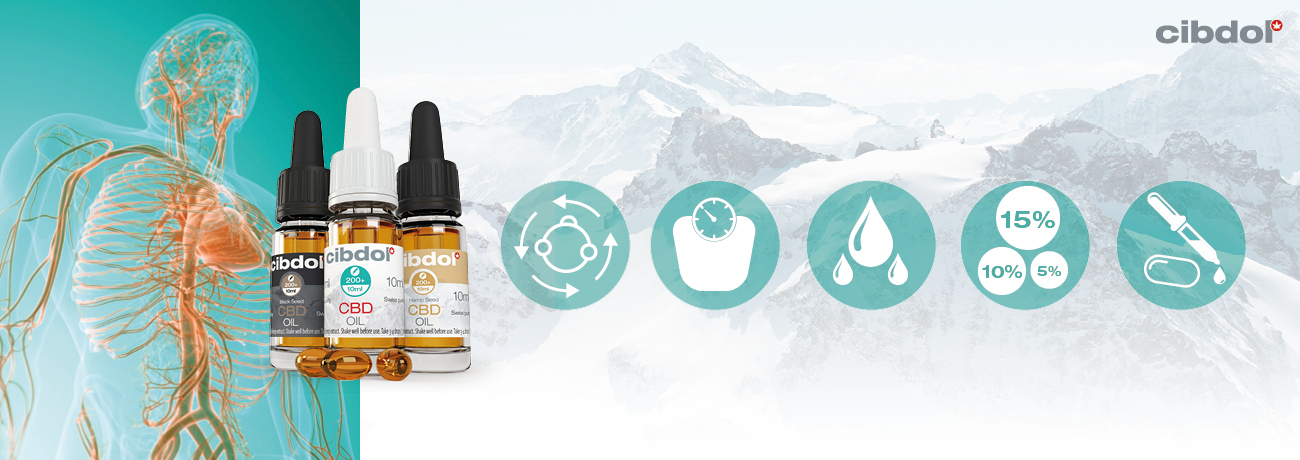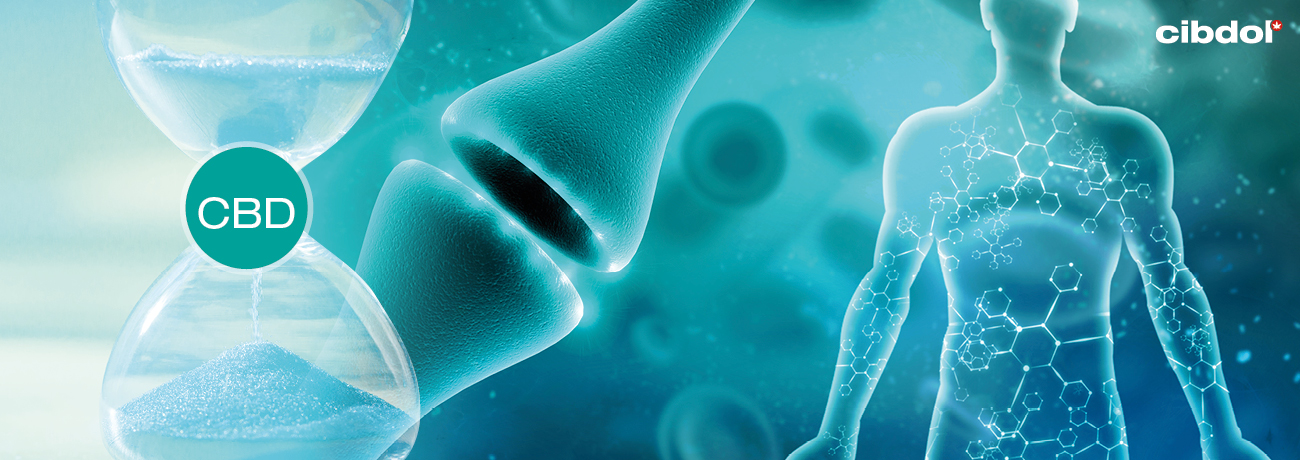How Long Does CBD Stay in Your System

CBD is becoming increasingly popular. And with more and more people using CBD supplements, many have questions about how long CBD products remain in the body after consumption. Below we'll explain how the body processes CBD, what the substance’s half-life is, and much more.
Contents:
How CBD works
CBD works primarily by interacting with the endocannabinoid system, a regulatory network that keeps the body functioning at its best. Unlike other cannabinoids, CBD doesn't bind directly with the ECS’s receptors, but works behind the scenes to deliver its unique effects.
The situation becomes a little more complicated because you can take CBD in a variety of different ways, with the method of administration playing a pivotal role in how the compound is metabolised (broken down and distributed around the body).
If you take CBD orally, for example, it has to pass through the digestive system before it can take effect. But, when taken sublingually (under the tongue) or inhaled through a vaporizer, CBD can bypass the digestive system and get to work faster.
How is CBD processed?
Once consumed and absorbed, CBD travels to the liver where it's metabolised into a variety of compounds that your cells can use. This metabolism is carried out by the same group of enzymes responsible for breaking down roughly 60% of all medications available on the market.
From the liver, CBD metabolites move around the body, where they may interact with a wide variety of receptors.
Although that outlines the basic journey of CBD, what we're interested in is how long the interaction between CBD metabolites and receptors last—how long CBD stays in your system. To understand that, we need to explain the concept of “half-life”.
What is half-life?
Half-life is the term used to measure the amount of time it takes for a compound to be reduced to half its original amount or effectiveness in the body. It's gauged by measuring blood plasma for metabolites of the compound in question. From the plasma, drug metabolites are either removed from the body or translocated to another type of bodily fluid.
Half-life is typically measured by administering a single dose of a compound, then testing blood plasma for traces of the drug at regular intervals. The amount of the drug in the plasma will usually increase, reach a peak, and then start to decline.
Using the information obtained while measuring CBD’s half-life, scientists can work out how long CBD stays in the body. You cannot do this yourself at home, but we can use their data to provide a general timeframe.
How long does CBD stay in your system?
The exact half-life of CBD isn't 100% clear, but we can explore some of the existing studies. There's evidence[1] that suggests that CBD has a half-life of roughly 2–5 days. This is based on a study involving 14 patients with Huntington’s disease. The patients were given doses of around 700mg of CBD per day for 6 weeks. Note that these doses are much higher than a standard recommended dose.
In another study[2], half-life of CBD was evaluated based on a single dose in the amount of 20mg and 18.8–19.4mg administered intravenously and smoked respectively. The half-life was accordingly estimated at 18–30h and 27–35h.
But, and this is an important but, that timescale will vary from one person to the next. How long CBD stays in your system is also affected by several biological factors, as well as the way you consume it.
As a general rule of thumb, the more efficient the consumption method, the faster CBD is processed, and the quicker it leaves our system. So, back to our earlier example, orally consumed CBD should stay in your system longer, compared to sublingual application or vaping. It's a delicate balancing act, but one that you'll need to experiment with to find out what works for you.

What affects the half-life of CBD?
Whenever talking about the metabolism of any compound, it's essential to realise that everyone's body is a little different, and several biological factors can influence your ability to process compounds such as CBD.
These include:
• Body fat
CBD is fat-soluble, so a small portion may get stored in fat cells. The cannabinoid can stay in your system for a little longer if you have a high body fat percentage.
• Efficiency of your metabolism
Our metabolism is a combination of chemical reactions, one of which includes the conversion of food to energy. The faster your metabolism, the quicker substances (including CBD) are broken down, processed and eliminated.
• Method of consumption
How you consume CBD not only alters the potency but the duration of effects. The method of consumption also goes hand in hand with bioavailability. Generally speaking, administration methods with greater bioavailability will also leave your system faster.
• Amount of CBD consumed
The more CBD you take, the longer it takes for your body to process it. Be careful though, high doses may produce mild side effects, so it's essential to find what works for you.
• Purity and strength of the oil/supplement you're using
The higher the concentration of a CBD oil or supplement, the longer it takes your liver to process, and the longer active ingredients stay in your system.
How long does CBD stay in your system—bottom line
CBD is a very unique and complex compound that can affect everyone slightly differently. Unfortunately, studies have not yet been able to pinpoint the exact half-life of cannabidiol. The half-life of CBD can be estimated to be between 18 and 35 hours, while other studies suggest that the half-life of CBD could be up to 5 days.
However, remember that these are ball-park figures. As we mentioned earlier, a lot of different factors can influence the rate at which your body processes and metabolises compounds like CBD. Until further studies look into the half-life of cannabidiol, these figures are the closest we've got.
[1] Consroe, P., Kennedy, K., & Schram, K. (1991). Assay of plasma cannabidiol by capillary gas chromatography/ion trap mass spectroscopy following high-dose repeated daily oral administration in humans. PubMed. https://pubmed.ncbi.nlm.nih.gov/1666917/ [Source]
[2] Ohlsson, A., Lindgren, J. E., Andersson, S., Agurell, S., Gillespie, H., & Hollister, L. E. (1986). Single-dose kinetics of deuterium-labelled cannabidiol in man after smoking and intravenous administration. PubMed. https://pubmed.ncbi.nlm.nih.gov/2937482/ [Source]







